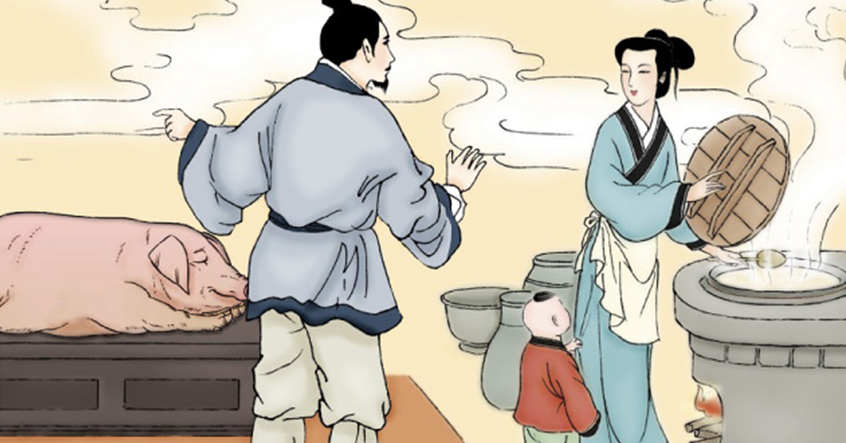The ancients said, “If the house has a strict father, it often has obedient children.” When looking at the stories of teaching children from ancient people, we can see that this word “strict” does not mean criticism or harshness. This word “strict” should not only be understood in one direction towards the child, but parents themselves need to be strict with themselves first.
To be able to do this, parents cannot be not strict with their own cultivation. Parents need to set high standards for themselves first in order to educate their children properly.

Parents need to set high standards for themselves first in order to educate their children properly.
The story of Confucius making pork: Parents being strict with themselves
Confucius, a student of Kongzi, was an outstanding student with many contributions to Confucianism.
One day, when his wife was preparing to go to the market, their young son cried and asked to go with her. Not knowing what to do, she said to soothe him, “Be obedient, listen to your mother, and when I come back, I’ll make pork for you to eat.”
When she returned from the market, she heard the sound of a knife being sharpened and hurriedly asked Confucius, “What are you sharpening the knife for?”
Confucius replied, “To make pork. You said that when you come back from the market, you would make it for the child.”
His wife blushed and said, “I was only joking to soothe the child. Why would you take it seriously?”
Confucius said, “We can’t play around with children. Children do not have the ability to reason and judge, so parents must teach and guide them. If you lie to them, you are teaching them to deceive others. If a mother deceives her child, the child will no longer trust the mother. How can we teach the child to become a virtuous person in that case?”
After that, Confucius and his wife made the pork and invited many friends to eat. Everyone asked, “Why did you slaughter the pig when it hadn’t grown yet?”
Confucius told them the reason, and everyone agreed and praised Confucius for doing the right thing.
Nowadays, quite a few parents are like Confucius’s wife, meaning they make empty promises to soothe their children but their actions are inconsistent, thinking that it’s just a small matter. In fact, this is a matter of not being strict with oneself, or rather, not being serious in the task of educating children. A lack of seriousness makes it difficult to achieve good and complete results.
President Reagan’s father: Gentle and rational when children make mistakes
Over 70 years ago, there was an 11-year-old boy in America who was passionate about playing football. One day, he accidentally broke a neighbor’s window and had to pay $12 as compensation. At that time, $12 was a considerable amount of money, enough to buy 120 eggs.
The boy admitted his mistake to his father and said, “I don’t have the money to pay, what should I do now?”
His father calmly told him, “I’ll lend you $12, and you can work part-time outside of school. After 1 year, you can repay the money to me.”
Hearing his father’s words, the boy diligently worked, and in just six months, he earned enough money to repay his father. This boy later became President Reagan.
Usually, parents will get angry, scold their children, and even impose additional punishments, believing that they are educating them in a strict manner. But Reagan’s father chose a different approach, a strict act with compassion and gentleness.
Indeed, compassion can touch people’s hearts. Because the father was not lenient about the mistake, and the child knew he had to take responsibility, but it was the father’s gentleness and rationality that made the child achieve more than expected.
A strict father who is strict with himself to set an example for his children like Confucius, gentle and rational like Reagan’s father when children make mistakes, is the ideal standard to implement the “strict” in the family and demonstrate the cultivation of parents. Therefore, in the future, their children can accomplish great things.
Learning Tips for Parents: 12 Japanese Techniques to Use with Your Children
Discover the 12 principles of teaching children in the traditional Japanese way that parents can learn with Dien May XANH! By instilling these principles when your children are young, you can ensure that they grow up to be obedient, smart and polite, the hallmarks of a successful education in Japan.





































